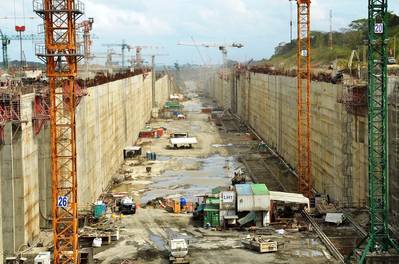Panama Canal Cost Dispute Headed to Miami Court
A $180 million claim involving the Panama Canal's disputed $1.6 billion cost overrun is headed to arbitration court in Miami next week, canal officials said on Monday.
The $180 million claim by the consortium working on the massive canal expansion project is the first of several disputed construction costs that could end up in the hands of the Miami arbitrators.
The cost overrun temporarily halted work on the massive expansion project in February, and the Panama Canal Authority now says the project is on track to open in January 2016.
Additional hearings for other claims may also go to arbitration should the canal authority and the construction consortium fail to reach a settlement under two other mechanisms established in the original contract, canal officials told Reuters.
Under that contract, all claims are analyzed by both sides before proceeding to a dispute adjudication board if a compromise cannot be reached. If either side is unsatisfied with the board's decision, the claim moves to arbitration in Miami.
A separate claim for about $888 million for work stoppages is still being discussed between the two sides, while another worth about $497 million for the quality of aggregate used for the concrete mix is at the dispute adjudication stage, according to the canal officials.
The first $180 million claim to reach arbitration, over the cost of draining an area to create work space near the Pacific locks of the 50-mile (80-km) long canal, was to begin July 21 with procedural hearings at the International Chamber of Commerce's arbitration court in Miami.
"Both sides will submit their terms and draft procedural orders for how things will work," said Carolyn Lamm, a lawyer with White & Case representing the construction consortium.
Labor and cost disputes have plagued the effort to expand the 100-year-old canal, fanning fears of delays that could cost Panama millions of dollars in lost shipping tolls and posing a setback for companies worldwide that want to move larger ships through the waterway that links U.S. South and East Coast ports to Asian markets.
Work ground to a halt in early February due to the dispute over who would bear cost overruns that boosted the project's $5.25 billion budget to nearly $7 billion.
In a deal signed in March, the Panama Canal Authority and the Grupo Unido por el Canal (GUPC) consortium led by Spain's Sacyr and Italy's Salini Impregilo agreed to inject $100 million to resume work. Both also agreed to extend repayment of $784 million of advanced payments made by the Panama Canal Authority to the consortium until 2018 at the latest.
Panama Canal Administrator Jorge Quijano in June said between 75 percent and 76 percent of the engineering project was complete, and a third set of locks to allow bigger ships to pass through the waterway should open in January 2016.
(By Zachary Fagenson and David Adams, Editing by Lisa Von Ahn)














